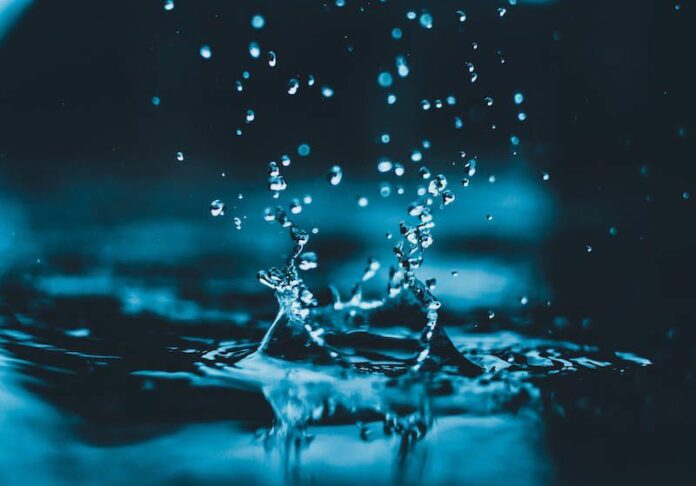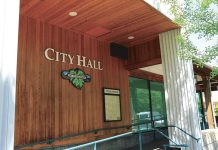Public hearing on water rates scheduled for June
Months after it decided to postpone setting new water and wastewater rates, the city will be holding a public forum to discuss possible rate increases this Wednesday, April 7.
“We’re one of very few cities in Sonoma County that’s responsible for maintaining and operating a water treatment facility. Most cities are retailers and they purchase water from the wholesaler, which is Sonoma Water. We’re somewhat unique in the sense that we operate our own water treatment plant,” said City Manager David Kelley during the March 24 Cloverdale City Council meeting, explaining some of the city’s operations.
Additionally, the city operates a wastewater treatment facility. Both facilities are separate from one another and are treated as independent businesses within the city’s budget.
“The city works hard to maintain these systems, both physically and financially, and the rate study is a key aspect of ensuring that we maintain the long-term financial viability of both of these enterprises,” Kelley said.
Water rates and deferred maintenance
As such, the city’s most recent water rate study proposed a sizeable increase in both water and wastewater rates — the dramatic increase in proposed rates was because of a lengthy list of capital improvement projects brought on by years of deferred maintenance to city infrastructure.
“What happens, unfortunately, is as you delay putting those costs in and paying for those projects, you’re just kicking the can down the road. If you pay for it now, you start setting aside money that helps you pay for it in the future, versus ‘I’m going to wait another year before I start collecting revenue to pay for these projects,’” Kelley said in an October 2020 interview with the Reveille. “In order to afford paying for the projects, you need to collect more.”
The rates proposed in November 2020, which have since been tabled, outlined a 13% water increase and 17% wastewater increase on Jan. 1, 2021, with the same increase happening on July 1, 2021 and on each subsequent July 1 through 2024. In the past, the cost of capital improvement projects haven’t been factored into the city’s rates and annual increases have been around 3% per fiscal year.
Discussion about the proposed rates was held in November 2020 and elicited over 894 pages of letters addressed to the city opposing the rate increases. From there, the proposed increases were withdrawn and the council decided to instruct city staff to organize a public forum where community members could learn about and discuss the rates.
Following city council postponement of the rate increase decision, the city spoke with Hildebrand Consulting, who performed the city’s water rate study, to look at the city’s capital improvement program.
“One of the key drivers of the proposed rate increases that were presented initially in 2020 were capital improvement projects, so one of the key strategies that was employed in developing alternate scenarios was really looking at deferral of the capital improvement projects,” Kelley said.
New rate increase scenarios
Pushing back completion dates for some of its projects yielded numerous possible rate increase scenarios, which Hildebrand Consulting owner Mark Hildebrand discussed on March 24.
Prior to introducing the new rate scenarios, Hildebrand pointed out that Cloverdale has the lowest combined sewer and water utility rates in the region, emphasizing its backlog of capital improvement projects and deferred maintenance.
“As we look at these rates, while we are looking at lower rates, the fact that we deferred rates in 2020 only makes the financial situation that much more difficult for both of the utilities, because that was a year of rate increases that we missed out on,” Hildebrand said.
Up until this point, the city has been raising rates around 3% per year, which according to Hildebrand, covers inflation but doesn’t account for the city needing to repair its actively aging water and wastewater infrastructure.
“Ultimately the rates are going to need to get to a point where they can pay for the annual capital reinvestment that’s going to have to happen every year,” Hildebrand said.
Hildebrand said legally cities aren’t allowed to charge more for water rates than it needs to run them, meaning the city can’t use water rates as a revenue-generating avenue and that money from rate increases can’t be used to supplement things like the city’s general fund.
Water Rates — Scenario one
Hildebrand said that the first scenario for water rate increases shows the impact of the city not adopting new rates in December and therefore not raising water rates for the current fiscal year. The first scenario proposes an 18% increase for Fiscal Year 2021-22, 14% for 2022-23 with additional 14% increases through Fiscal Year 2025-26, 6% increase for 2026-27 and a 2% increase each year from 2027-28 to 2030-21. This results in a cumulative increase of 99% over five years.
Water Rates — Scenario two
The second scenario further defers some of the city’s maintenance projects at proposes a 10% increased in 2021-22, 14% increases in 2022-23 through 2024-25, a 10% increase in 2025-26 and 2% increases in 2027-28 to 2030-31. This results in a cumulative increase of 79% over five years.
“What you’ll notice in the rates that we’re presenting is that we specifically made an effort to lower the rate for July 1 … we do recognize that this is not a great time to be asking the community to pay more for their utilities because of COVID and all of the impacts. We’re aware of that, and we made a strong effort to create scenarios where we really minimized the rate increases that would happen in the immediate future,” Hildebrand said.
Water Rates- Scenario three
The third water rate scenario presented by Hildebrand pushes back the large increase in rates, but still proposes a 6% increase in Fiscal Year 2021-22. Following that increase, it proposes 12% increases yearly from Fiscal Year 2023-24 to Fiscal Year 2026-27, with 6% increases in 2027-28 and 2028-29, ending with 3% increases from 2028-29 to 2030-31. This results in a cumulative increase of 67% over five years.
Wastewater Rates — Scenario one
The first proposed scenario for Cloverdale’s wastewater rates begins with 17% increases for Fiscal Year 2021-22 to 2025-26 and 4% increases each year from Fiscal Year 2026-27 through 2030-31.
Wastewater Rates — Scenario two
The second scenario proposes a 7% increase in Fiscal year 2021-22, 13% increases from 2022-23 to 2026-27 and 2% increases from Fiscal Year 2027-28 to 2030-31.
Wastewater Rates — Scenario three
The third proposed scenario for rate increases begins with a 3% increase in Fiscal Year 2021-22 and shifts to 10% increases from Fiscal Years 2022-23 to 2025-26. The rates would then have 4% increases from Fiscal Year 2026-27 to 2029-30, with a 3% increase in 2030-31.
Following the rate presentation from Hildebrand, Mayor Jason Turner said that he likes the idea of easing people into the rate increases, especially given the impacts of the pandemic.
“When staring down the barrel of inevitable, I like that approach because it gives people an opportunity to adapt. One of the recurring themes that I try to keep in mind as I navigate through policy and what’s asked of us as council members is what can I do to allow folks to control their own fate as best that they can … despite our best efforts, even if we get 1,000 to participate in the public workshop, that’s 8,000 people that will be surprised by this. It does afford them the opportunity to adapt and make changes rather than what we saw in November,” Turner said.
According to the city’s website, the water rate forum “will provide an opportunity for the community to learn more about the financial rate study including the financial obligations for ongoing operation and maintenance, debt service and capital improvements while maintaining prudent financial reserves. The forum is intended to allow the community to provide input and comments on the study and rate adjustments necessary to fund ongoing operations and capital improvement projects to support water and sewer services for our residents.”
Following the April 7 forum, a final recommendation about the rates is scheduled to be made to the city council on April 14, with a public hearing scheduled for the rates on June 9. Whatever rates are decided will be effective and implemented in July, since that’s the start of the city’s fiscal year.
For more information about the forum, which will be over Zoom, click here.









